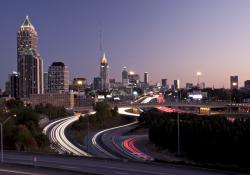
The 78th IBTTA Annual Meeting and Exhibition takes place 12-15 September at the Hilton San Diego Bayfront, San Diego, California, and will focus on sustainability (Picture: San Diego CVB)
Ken Philmus, chief meeting organiser, talks about what attendees can expect to see at this year's IBTTA annual meeting and exhibition
The conference programme at theLeadership and environmentalism will dominate the keynote addresses. Philmus is particularly excited by the inclusion of photographer Chris Jordan, the man behind 'Running the numbers', who uses photography to bring consumption and waste statistics to life and make them more easily understood.
"The programme will certainly be topical. It will focus on important issues of the day rather than product presentations - that is, the role of the extensive exhibits planned by industry vendors. We're going to be addressing sustainability, something which is very current, but from a number of different perspectives. Most people think only of the environment when mention is made of sustainability. But sustainability can also encompass the financial and organisational, and that wider focus will be reflected in both the keynote speeches and the break-out sessions."
"More viable"
A major part of this year's conference programme will concern itself with the role of tolling, which continues to evolve to meet overarching government goals."Particularly in the US with the growth of High Occupancy Toll (HOT) lanes and variable pricing, there's a growing realisation that tolling, or charging, can be used to manage congestion, not just to raise money," Philmus continues. "That has increased exponentially in recent years, and DOTs now regard tolling as a more viable option. More and more, it's being viewed as a part of a total solution, not just as a means of building a road or bridge.
"Privatisation is starting to come back, especially on greenfield sites. Many states are also showing interest in tolling existing interstates, where it's seen by many as perhaps a more realistic means of raising money for transportation infrastructure when there is no support for increasing fuel taxes. User fees, in the form of tolling, allow for more targeted revenue collection in that only those who use those facilities which need repair and maintenance will have to pay. A good example is the I-95 corridor on the East Coast, where many different states have been looking at the possibility of implementing tolls. There are other examples of this type of thinking across the US, such as in Wisconsin and Wyoming where there have never been toll roads.
"One of the things I'm most pleased about is that a primary sponsor of this year's meeting is CTOC [the California Toll Operators Committee]; the State of California is a microcosm of tolling operations in the US. You'll find every business model of toll financing and organisation represented there, from full and partial privatisation through to DOT operation of facilities.
"We can cut a long story short by going back and comparing with 30 or 40 years ago," he continues. "Then, the IBTTA was in many ways an insular club comprised of independent tolling agencies who came together to discuss how best to manage their discrete operations - how to uphold their bond covenants and best service their customers. That was often the limit of their conversations. We want this conference to reflect how far we've moved on since then."
General and breakout sessions
There will be three general sessions at this year's annual meeting.The first will take advantage of CTOC's involvement and its wide experience of different tolling models. It will ask, 'If tolling is the answer, what is the question?' The second session will look at the evolving role of state DOTs which, over the last two to three years, have started to take on a much bigger role in tolling. The third will be based around IBTTA Executive Director and CEO Pat Jones's blogs and is being billed as the segment of the conference programme where the most topical issues of the day will be discussed.
The meeting's location will take advantage of CTOC's broad experience, especially when it comes to HOT lane deployments, Philmus says: "In particular, we'll be looking at the state-wide implementation of HOT lanes such as in the Bay Area, where a whole network is being deployed, as well as at what's going on in and around Los Angeles. There are also sessions which are going to deal with California's tough emissions and environmental laws, and what these mean for operations.
"We're also going to be exploring tolling's role as part of a wider mobility strategy.
That will include, for example, its interrelation with transit. I've long believed that tolling is only one piece of the puzzle. For some time now, several regions in the US have used toll revenues to purchase buses or subsidise mass transit directly with the end goal of maximising the movement of people and goods in their region rather than a sole focus on an individual road facility. Although this isn't exactly new, I think it's something that we need to explore more as monies for transportation become so much more difficult to find."
Reauthorisation
With reauthorisation of the US's transportation bill still some way off, there is considerable interest in what form the new bill will take relative to tolling and how industry stakeholders can influence this. A recurring issue is that transportation is never considered a priority until something goes wrong, says Philmus."If you look at the annual US Presidential State of the Union address, transportation is never mentioned. It's easy to see why from a political perspective: there's no ribbon-cutting ceremony or press conference associated with funding ongoing pavement maintenance or shoring up an existing bridge. The car has been with us since the early 1900s and our first major road networks were built in the 1920s and 30s; some of the latter are getting very old and we don't have the money to maintain what we already have. And yet public-private partnerships are still considered to be a bad thing by many in the political realm because they're viewed as somehow giving the roads away to third parties rather than being just a lease to operate.
"We saw some progress after the I-35W bridge collapse in Minneapolis, maybe a year's-worth, but then things slowed again. We have wars, stock market collapses, and we'll spend billions there but we don't, or won't, spend on transportation. We'll eventually pay for such short-sightedness. I just hope it isn't with more bridge collapses.
"It's a part of the IBTTA's role to address that. Historically, tolling hasn't been tapped sufficiently as a funding source and we need to gain wider acceptance of its use for broader transportation needs."
Standing at the crossroads
Conceptually we are at a crossroads but global comparisons are worthwhile, he feels."Look at developing countries - why do they concentrate on transportation infrastructure first? It's because they can't economically develop without decent, functioning transportation networks. China and India, to give but two examples, are putting billions into transportation. We did that in the United States, historically. Now we have to do it again - re-invest. That means taking a new view on things, not just using tolling to build individual roads.
"Some countries in Europe, for example, have developed very effective high-speed rail links. In the US, by contrast, 'high-speed rail' usually consists of coasting along at 80mph on bumpy tracks because that's our current expectation. We have to get beyond that, and that means no longer looking separately at transportation modes but rather at how best to move people and goods in totality and not just maximise the movement of vehicles. The irony is that by contrast with other countries the US has money which is ring-fenced for transportation. We just don't use it as well as we perhaps could and in recent years have identified much more need than money that has actually been placed inside that fence.
"I've been both sides of the public-private divide and because of worldwide economic difficulties there is a definitive focus on price, not best value. We need to stop drop-kicking the transportation problem into the future and making it someone else's problem.
"The next reauthorisation bill is going to be very, very interesting. The current situation, whereby the states with the more powerful elected representatives end up proportionally getting the most money, is unsustainable in the long run. With the growing interest in implementing transportation performance measures there is hope that we will have a better view of where the money should really go. That means looking past the metrics of day-to-day running such as consistent journey times and placing much more emphasis on tolling's contribution to regional mobility and quality of life. That includes bringing agencies which were previously standalone entities into the fold.
Non-conference events
There will be a golf tournament as part of the conference this year. Directly benefiting the IBTTA Leadership Academy and the IBTTA Foundation, this will take place on the afternoon of Wednesday 15 September. The tournament has been especially successful in recent years in as a fund raiser for the Leadership Academy, where mid-level executives network and prepare for the senior leadership roles which they will assume in coming years.
The outside tours programme is going to be a little different this year in that it will be coordinated by an outside tour operator. By offering participation in a broader range of tours that are not solely for IBTTA, there will be many more options and opportunities for sampling the many wonderful experiences in San Diego."The 'challenge' is also shifting in the geographical sense. We have to take more account of interurban issues. A huge number of people now live and work in the suburbs. That means that some of our greatest congestion issues are now on inter-suburban routes and not in city centres.
"Risk management is another topic which will be dealt with in one of our sessions in broader terms than are usually considered. Risk management is most typically looked at in financial terms but we will try to frame risk management in much broader terms for agency executives." All of this has to be viewed against a background of technological progress, something else which is happening at an exponential rate according to Philmus. And that technological progress is not limited to traditional toll technology change: "We will have an entire track on Innovation at the conference that, among other things, will look at how the recent explosion of social media can be best used within the toll industry."





